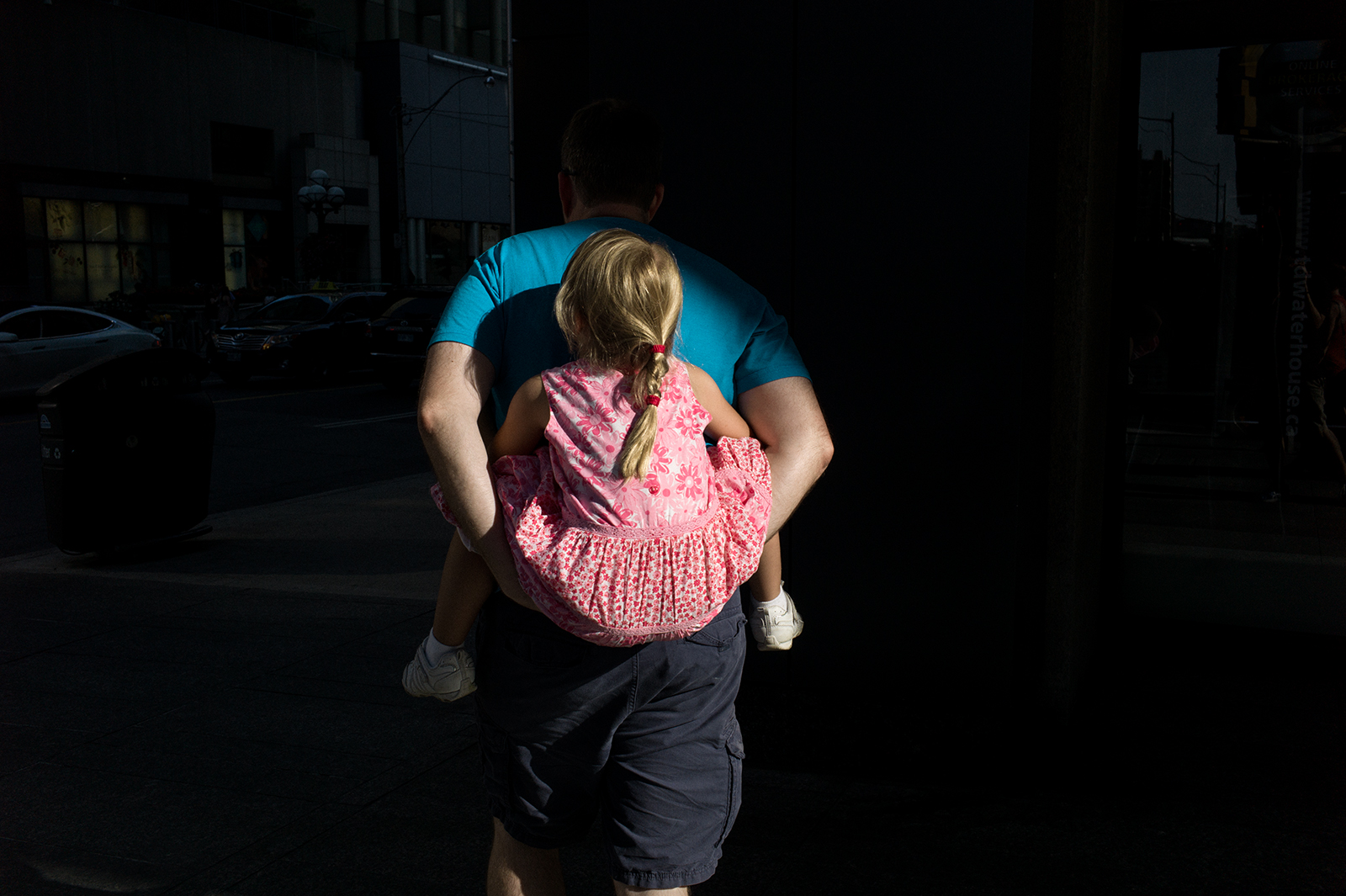Confrontation is part of shooting on the street. Street photographers are often called out as perverted or even pedophiles for the simple act of recording life as it lives itself. What is fueling this villification and what can street photographers do about it? Hit the jump for more info.
I’m Not A Pervert, I’m A Street Photographer!
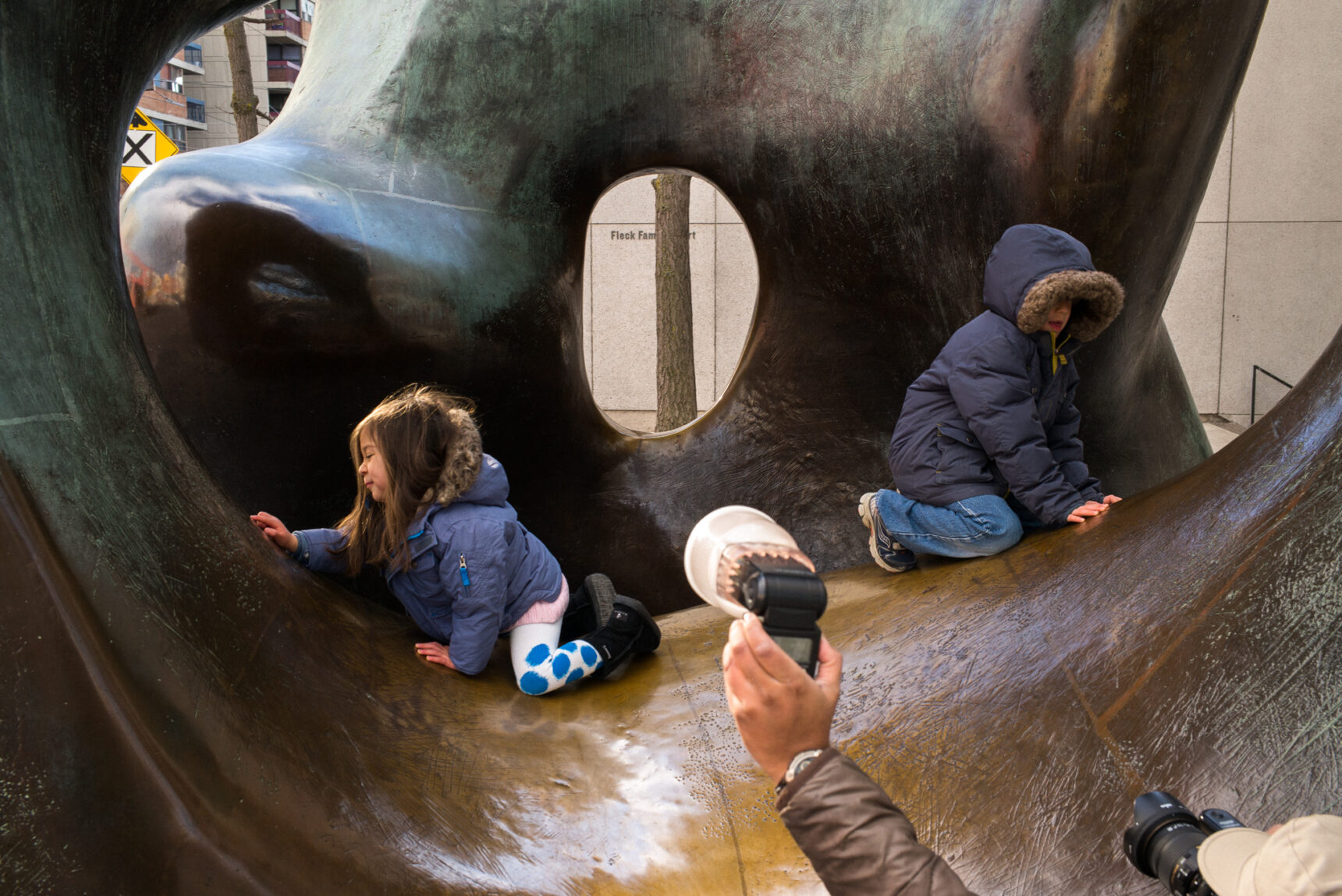
Shoot on the street for long enough and you’re going to run into confrontation. And as more and more street photographers are accused of being perverts and pedophiles it’s becoming clear that photography has become villified to the point of being considered an offense in its own right.
In a recent article on PetaPixel, Randall Armor describes a situation where Karl Baden, an established street photographer with prints in the permanent collection of the Museum Of Modern Art, is called a pedophile for photographing a scene containing a minor:
I walked out of Trader Joe’s yesterday just as the rain let up and the sun broke through the clouds. Got in my car, took a few pictures of the light through the window, then began to pull out of the parking lot. A red van starts following me, the driver’s yelling, blasting the horn.
The van passes on my left, guy inside screaming at me. He pulls ahead, angles the van to the right, then brakes, blocking my way. I put it in park and start to put my window down, trying to think of what I might have done. He jumps out of the car, furious, cursing:
“I saw what you did! Taking pictures of that boy’s behind! You {Expletive Deleted} pedophile!!!”
“No, listen,” I say, “I’m just taking pictures from my car. You don’t understand…”
“You {Expletive Deleted} piece of {Expletive Deleted}! The only reason you’re still breathing is that there are people around!!!” He turns to the passenger next to him, “Get his license plate!”
The article goes on to describe several other instances where street photographers are painted as perverts and social miscreants as random people mistake the creative process as some kind of perverted ritual.
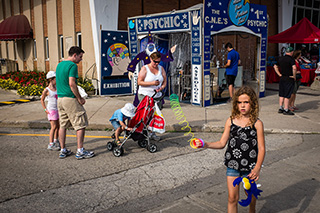
I can say a similar thing happened to me a couple of years back. I was walking along a busy street in downtown Toronto when I spotted 2 kids wearing brightly colored shirts climbing a pole as hordes of grey faced businessmen shuffled by like zombies. Felt like street photography gold so I grabbed a quick shot.
The father saw me take the picture and immediately ran up to me and yelled, “You just took a picture of my daughter’s butt!” I understand that he may not have seen the scene in the way I did, but his response still puzzled me. There were no questions. The act of photographing his daughter was automatically sexual and I must, by association, be a pedophile.
But how did we get to this point? How did street photographers become so villified as to automatically be labelled as the lowest of the low for simply bearing witness to something in their viewfinder? If you step outside of street photography for a second you can see that photography itself is typically portrayed as an agressive form exploitation in the media.
From revenge porn sites to reports of terrorists photographing bridges to plan an attack, photography has been seen as a weapon for decades. Investigative newscasts regularly use their cameras to corner the bad guy and reality TV shows delight in showing the behind the scenes moments that expose the character for who they really are. The advent of cameras in cell phones means that cameras are everywhere and people feel they’re under constant threat of unwanted exposure.
In short, people have evolved a distrust for the photography that often leads them to jump to the wrong conclusion about street photographers. It doesn’t even occur to them that we’re creating some form of urban art that finds beauty in everyday moments.
So what’s the best way to handle agressive confrontation on the street? I reached out some of my favorite street photographers to get their take on confrontation and shooting on the street and the responses are as varied as the situations they photograph. Let’s have a look:
Danielle Hougthon (Observe)
StreetShootr: How do you deal with confrontation on the street? What’s your typical response?
Danielle Hougthon: I usually apologize for causing any offence and explain what I liked that made me take the picture. If I am asked to delete I do or I say I will later. But if somebody is not reasonable I may get a bit cheeky back and stand my ground then.
SS: Have you ever been called a pedophile when photographing childredn? What was your response?
DH: I have never been called that, the closest may have been some teenagers calling me a pervert but they were laughing as they said it and I possibly sometimes have received suspicious vibes. My worst confrontations ironically have been with people I did not take a picture of.
SS: Why do you think photography has been villified to this extent? Has this changed in the time you’ve been shooting?
DH: Unfortunately more and more paranoia has crept into society and photography has been vilified as people are more aware of some of the negative uses of photographs so tar everybody with the same brush. I have only been shooting street steadily for the last 5 years so I think before then it probably was less prevalent as kids in street photography historically played a huge role.
SS: What advice do you have for street photographers when they are confronted on the street?
DH: I would try reason before confrontation, or even a simple walking away. Some photographers bring business cards or booklets which can help make somebody feel more at ease.
What do you do to avoid confrontation? Are there any subjects that are off limits for street photography?
DH: I try to go by my instincts to avoid confrontation. I wouldn’t say any subject should be off limits, but rather it depends on your attitude and intent towards them.
Danielle Houghton On Observe.
Danielle Houghton On Flickr.
Siri Thompson
StreetShootr: How do you deal with confrontation on the street? What’s your typical response?
Siri Thompson: I think being female and photographing on the streets is very different from being a male photographer. In fact, I have never been confronted by a man, it has always been a woman and generally speaking it will be an onlooker and not the person I was photographing. Typically I will apologize and if asked to delete a photo, I will.
The only confrontation that got out of hand that I’ve had, was early in my street photography days. I was focused on a dog (what else) and took a shot with a flash. Unfortunately, I had not noticed that the dog was with a homeless couple and the woman rushed forward and physically assaulted me, slapping my arm and trying to grab my camera (the Gordy strap was sturdy). Her boyfriend had to pull her off me and tried to make sure I wouldn’t call the police, which I wouldn’t have. The funny part of this whole scene, was that a few homeless guys had watched the whole event unfold and they came over to tell me that I could photograph anyone I wanted on the street. That part made me laugh a bit, especially as I try never to photograph homeless people.
I also had an incident with a female police office while I was photographing in Coney Island. A lady had fallen and cops had put up some police tape along the side of the street. The tape was nice and interesting and I tried to take some photos of the police tape and combine people into the shot. The police officer came over and gave me a really hard time, and when she left this guy who was standing beside me said “I think she wanted to arrest you”.
SS: Have you ever been called a pedophile when photographing children? What was your response?
ST: I have never been called a pedophile. However, once I was in a children’s playground and wanted to photograph kids on a climbing apparatus. I asked permission of the father who was with the kids, and he said “no problem”.
Midway through photographing the kids, another kid joined in but I didn’t stop photographing, mostly because I had no idea he wasn’t included in the permission. After I finished taking photos, the mother of the kid who joined in confronted me. Someone had told her I had been taking photos of her kid on the climbing bars and she was very upset. At first I didn’t even know which kid she was talking about and I explained to her that I had asked permission before starting to photograph, but she was adamant and wanted to see all the photos. I never show the photos on my camera, so I took her email address and sent her a selection of photos with her kid. I never heard from her, not even to thank me for sending the photos.
SS: Why do you think photography has been villified to this extent? Has this changed in the time you’ve been shooting?
ST: I find it very interesting that nowadays people take so many selfies, even have selfie sticks, send photos of themselves naked or of their various body parts to their friends, however they are upset at being photographed walking down the street, fully clothed, by a stranger.
There’s a combination of things to consider, one being the distrust of strangers, which is driven by the media. I think people generally feel the only reason a stranger would photograph a child, for example, would be for nefarious purposes. Ironically, statistics show that people (children included) are usually abused or mistreated by people known to them and not by strangers.
Another issue is that people in general feel that street photography, or people that practice street photography are creepy. It really can appear to be creepy behavior. I had a parent who’s kids went to school with my kids ask me about my taking photos at an event and even though I explained a bit about street photography, he gave me this look that made me think he thought I was creepy and this is someone who knows and likes me. So imagine how this behavior appears to people who don’t know you.
In the time that I’ve been shooting I don’t think this has changed. I have a good friend who is a street photographer tell me he never ever photographs kids he doesn’t know. He said it wasn’t worth the problems.
SS: What advice do you have for street photographers when they are confronted on the street?
ST: Always be humble, apologize, defuse the situation if you can and move on. Watch for onlookers that appear to be getting upset, in my experience they cause the most problems. Sometimes if a particular spot is interesting and I see an onlooker getting agitated I will take a slow walk around the block and often the crowd has changed by the time I get back.
SS: What do you do to avoid confrontation? Are there any subjects that are off limits for street photography?
ST: I try always to be obvious about what I’m doing so that people are aware that I’m taking photos. If they don’t notice me, or don’t care that I’m there, then I photograph them, if they do care they will usually avoid the camera.
I think marginalized people and homeless people are for the most part off limits or should be off limits. I think a photo with these people in it, has to be exceptional to be taken.
Blake Andrews (iN-Public)
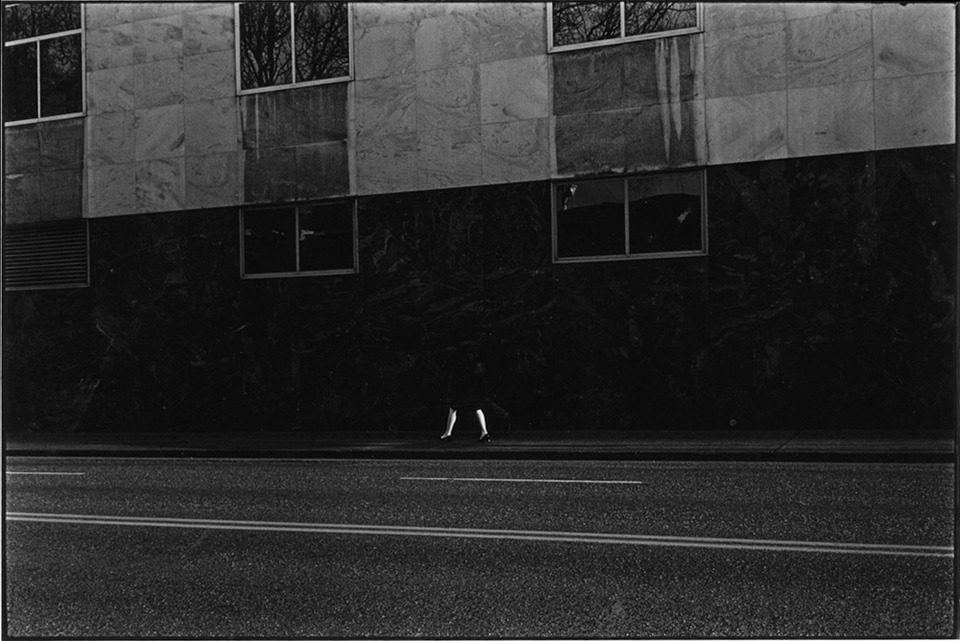
StreetShootr: How do you deal with confrontation on the street?
Blake Andrews: I tend to defuse situations and avoid confrontation.
SS: What’s your typical response?
Explain myself calmly. Walk away.
SS: Have you ever been called a pedophile when photographing children?
BA: No. I’m generally careful about shooting children.
SS: What was your response?
BA: N/A.
SS: Why do you think photography has been villified to this extent?
BA: Mostly self inflicted. Street photographers tend to have an inflated sense of purpose which can cloud their judgement during interactions with pedestrians.
SS: Has this changed in the time you’ve been shooting?
BA: It’s hard to say, but I think yes. Just a numbers game. More photographers and more awareness of cameras has led to more conflicts and tension.
SS: What advice do you have for street photographers when they are confronted on the street?
BA: Be yourself.
SS: What do you do to avoid confrontation?
It’s not too difficult. Confrontation generally finds those who seek it. Not me.
SS: Are there any subjects that are off limits for street photography?
Absolutely Not!
Blake Andrews On iN-Public.
Blake Andrews B Blog.
David Horton (Observe)
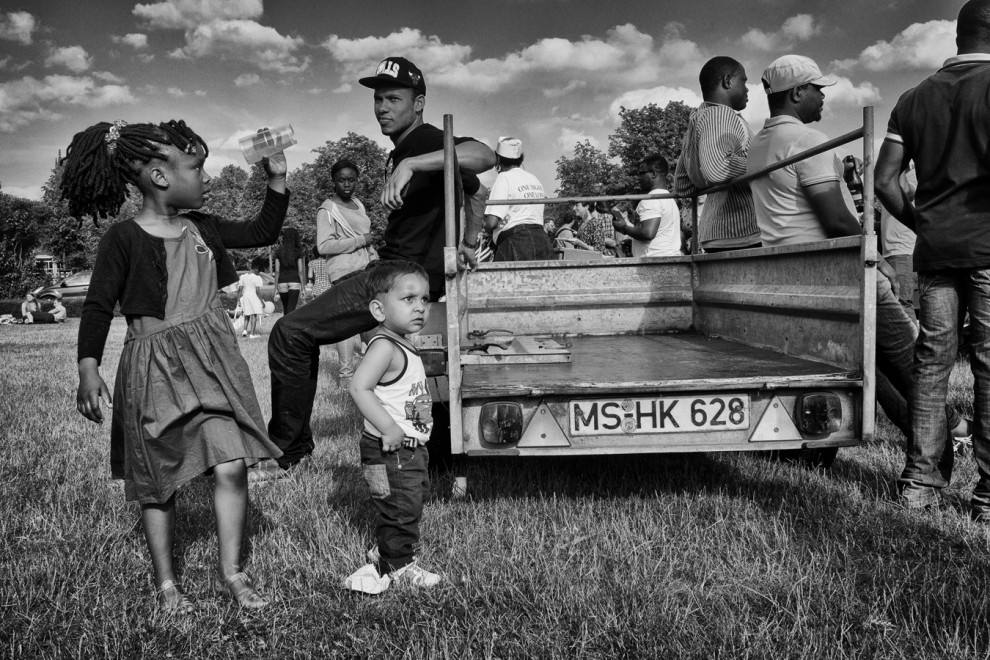
StreetShootr: How do you deal with confrontation on the street? What’s your typical response?
David Horton: I always find that honesty and sincerity is my best response. If you explain what you’re doing—”I’m trying to make ordinary moments into extraordinary pictures”—that seems to resonate with most people. However, you must be confident in yourself and what you’re doing. That is the single most important factor. People pick up on that confidence and are reassured and put at ease by it. More often than not, I look people in the eyes and smile after taking a picture. A smile goes a long way.
SS: Have you ever been called a pedophile when photographing children? What was your response?
DH: I often shoot at this amazing beach just outside the city. It’s a wonderful melting pot of cultures. I was photographing some kids playing and as I turned away, I noticed the mother walking towards me. She was far enough away that I didn’t think an explanation was necessary so I just continued on. A short while down the beach, a police car pulled up and called me over. After checking my ID, they said they received complaints about someone taking pictures of children. They told me I couldn’t do that. I responded by saying, “I suspect you know that’s not true. I’m taking pictures in a public space.” I wasn’t being a smart ass or disrespectful, I was just letting them know I was aware of my rights. And honestly, the one questioning me was trying to intimidate me and was acting a bit arrogant and condescending. I did offer an explanation that I was a serious photographer that took pictures of everyday life and that I find kids particularly fun to photograph. The one questioning me said, “well I think it’s perverted and weird.” To that I responded, “well I think it’s really sad that you think that.”
Although I didn’t let him intimidate me, the whole encounter really made me feel like shit and kind of spoiled the rest of the day for me.
SS: Why do you think photography has been villified to this extent? Has this changed in the time you’ve been shooting?
DH: I think cases of exploitation on the internet have made everyone paranoid but especially parents. It’s very unfortunate especially when your intentions are pure.
I’m in a photography collective and was recently in Germany for an opening of a show we’re having. We were all out shooting one day at a castle, a location tourist attraction, and one of our guys photographed a kid walking by and the mother got VERY upset. My wife tried to talk to her later in the day and explain who we were and what we were doing but even with that, she was still very skeptical. A few more encounters happened throughout our time in Germany and the common concern was whether the pictures would end up online. That’s a tricky question. I don’t like to lie to people. When I explained that they may be posted on sites specific to photographers, even that doesn’t calm them. And everyone felt this way, not just about kids.
I don’t know if this is true or not but we were shooting in Dusseldorf one day and people seemed particularly paranoid. Someone on the street said that police go around undercover and photograph suspicious people and activities for their records. If that’s true, that really sucks for street photographers. No wonder people are paranoid.
SS: What advice do you have for street photographers when they are confronted on the street?
DH: Remain calm and polite and try to explain what you’re doing in a respectful way. If someone asks you to delete a photo, just do it unless you think it’s a really good picture—then know your rights and be prepared for a struggle. In my experience, it’s easier just to delete a photo if someone asks you to. Nine times out of ten the photo is crap anyway. Once I stood my ground, just on principle, and had a guy grab my camera and try to rip it out of my hands. Fortunately, a cop appeared and reprimanded the guy but that really shook me up. That was early in my street shooting days and I’ve found it’s best to avoid confrontation whenever it’s possible.
It’s also a really good idea to have business cards with your name, email and phone number to offer. The cards can have one of your photos on the back side or a statement of your photographic philosophy. This offers credibility and reassurance to people. I keep a small Blurb book of some of my images in my bag as well. When people see examples of what you do and that you’re serious about what you’re doing, they’re often put at ease. I also offer to send a print or electronic file if people are interested.
SS: What do you do to avoid confrontation? Are there any subjects that are off limits for street photography?
DH: Learn to read body language. If you’re paying attention, body language speaks volumes. Some people and situations really need to be avoided and body language will tell you that.
Eye contact and a smile really do go a long way. Be open and honest and don’t try to be sneaky. If you look like you’re trying to hide what you’re doing, people pick up on that and will get suspicious.
David Horton On Observe Collective.
David Horton On Flickr.
Eric Kim
StreetShootr: How do you deal with confrontation on the street? What’s your typical response?
Eric Kim: I apologize and don’t run away. I sometimes bow down to people to show them respect and let them know I meant them no harm. I compliment them and tell them what I found interesting about them.
SS: Have you ever been called a pedophile when photographing children? What was your response?
EK: No. When photographing kids I never do it in secret. I talk to the parents and laugh, say hello, and interact with the kids.
SS: Why do you think photography has been villified to this extent? Has this changed in the time you’ve been shooting?
EK: I think there is more suspicion about pedophiles now because of the media, but the less creepy you come off, the less creepy you will look.
SS: What advice do you have for street photographers when they are confronted on the street?
EK: Be transparent. Don’t lie. Tell the truth. Be confident and know you’re not doing anything wrong.
SS: What do you do to avoid confrontation? Are there any subjects that are off limits for street photography?
I would say every street photographer should expect confrontation. Prepare for it beforehand, and it will make things easier. Personally I avoid homeless and mentally sick people, and if in doubt, ask for permission.
EricKimPhotography.com.
Eric Kim On Flickr.
StreetShootr’s Take
Shoot on the street for long enough and someone’s going to object to being photographed. But no matter how many times I defuse a confrontation it takes me by surprise every time and I walk away thinking about how I could have better handled the situation.
The thing about confrontation on the street is that nobody is going to call you out for being a photographer. Even though someone may feel wronged for being photographed it’s irrational to shout out “PHOTOGRAPHER!” So the situation normally preceeds to being accused of assailing someone’s rights. “You need my permission before you can do that!” is a common rebuke heard by many street photographers.
But when the confrontation comes from people who simply witness us shooting the problem takes a different shape. Onlookers who see you photographing a child often jump to the conclusion that you’re a pedophile and the act of taking a picture becomes an assault. Nobody would deny that this kind of behavior is reprehensible and to simply name it seems to make the accusation unassailable. Like yelling “WITCH” in 17th century Salem – the accusation somehow becomes evidence.
The best defense is to be prepared and know how you’re going to reply to confrontation in advance. Relax, and tell the truth. Change people’s perspective one person at a time. Remember we’re battling a perception of photography as a weapon. People aren’t necessarily reacting to what we’re doing – they’re reacting to what they think we’re doing because of something they’ve seen on TV. It’s a great chance to change their mind.
I think street photographers often fail at defending our actions especially when we’re confronted unexpectedly. You can’t just blow the situation off with curt statement like, “I didn’t break any laws!” Take the time to talk about what you’re doing and why you’re doing it. If someone asks if you just took their picture, say hello and let them know what attracted your eye. Could be the way the light created interesting shadows as they walked past, or maybe you just liked the color of their hat. Let them know!
Remember, when someone verbally accosts you they’re looking for the kind of repsonse that proves they were right about you all along. Surprise them with friendly conversation and a discussion of what you’re doing and you’re taking a step in the right direction.
The Great War on Photographers: A Dispatch From The Trenches
What’s your take on confrontation on the street? Are street photographers getting what they’re asking for? Or has the perecption of photography as a weapon skewed the perception of our beautiful art? Post your ideas in the comments below and keep the conversation going!

